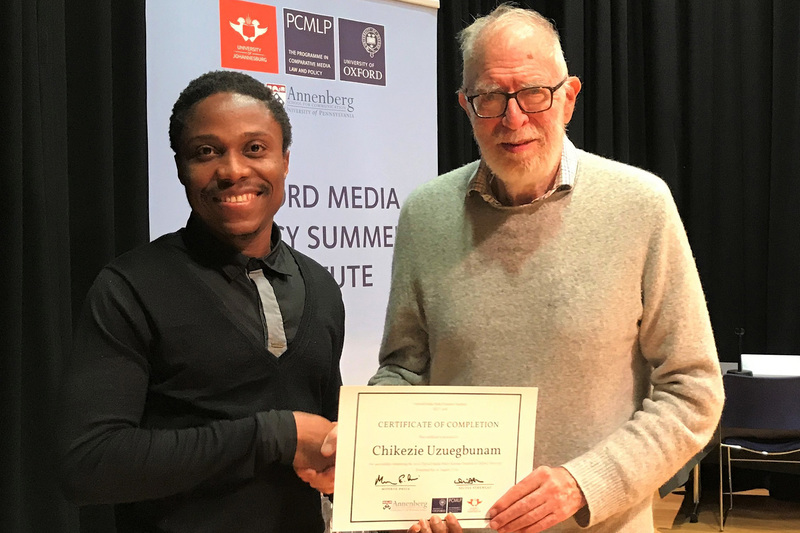‘Power-packed’ Oxford fellowship
22 August 2019 | Story Supplied. Photo Supplied. Read time 5 min.
Honoured with the opportunity to participate at the highly-competitive 2019 Oxford Media Policy Summer Institute in the United Kingdom, University of Cape Town (UCT) doctoral candidate Chikezie Uzuegbunam shared his research around the digital life experiences of young Nigerians.
The Centre for Film and Media Studies student, who is also a teaching assistant and senior postgraduate mentor, will be awarded his degree in December. His thesis offers a multidimensional portrait of teenage children’s practices with and negotiation of digital technology in rural and urban spaces.
Thanks to full funding by the Ford Foundation, Uzuegbunam participated in the prestigious programme, introduced in 1998, which brings together top early-career scholars, media lawyers and regulators, human rights activists and policymakers from across the world. They debate emerging international trends in technology, international politics and development, and their impact on international media and society.
Organised by the University of Oxford Faculty of Law’s Centre for Socio-Legal Studies, under the auspices of the Programme in Comparative Media Law and Policy, the summer institute is an intensive, interdisciplinary two-week fellowship comprising lectures by experts, participatory discussions, group work, city tours and scholarly engagements.
This year’s event was organised in collaboration with the University of Johannesburg (UJ) and the University of Pennsylvania in the United States.
International participation
Uzuegbunam, who described the fellowship as “a power-packed and highly enriching experience”, said participants and speakers came from 25 countries. He was among only four South African participants, the other three from UJ.
Other African countries represented included Nigeria, Kenya, Uganda, Zimbabwe and Ethiopia.
He explained that participation is usually sponsored by participants’ organisations and institutions. In a small number of cases however, including his, participants are recommended for Ford Foundation funding via a grant from the Institute of International Education (IIE) in New York.
The funding covered his institute attendance, accommodation for two weeks in Oxford, travel costs and living expenses.
“As a young scholar whose research focuses on the area of digital technology, I’ve been greatly informed about ongoing evidence-based insights in the field.”
Uzuegbunam said the theme of the 2019 fellowship, which ran from 4 to 17 August, was “Technology and Policy at the Margins”. It paid attention to how the internet and other digital technologies are rapidly changing global media environments, the consequent challenges, particularly in respect of policy building, and understanding the dynamics of new technologies like artificial intelligence, biometrics and social media – along with how users’ rights can be protected.
“The lectures, discussions and group work that formed part of the programme followed an interdisciplinary dimension and considered the experiences, nuances and dynamics of technology use, regulations and digital challenges from multiplex backgrounds – in the global north and global south contexts,” he said.
Hate speech and fake news
“A range of topics focusing on the teething issues around media and technology were covered, including online hate speech and fake news, international actors in media and sovereignty, innovation at the margins, evolving mechanisms of media and online censorship, UK media policy after Brexit, media and [the] migration crisis, algorithmic public sphere and artificial intelligence, connecting the unconnected and the role of community networks, among others.”
Individual presentations were voluntary, but Uzuegbunam presented on the topic, “The digital lifeworlds of young Nigerians: A multidimensional portrait of rural and urban teens’ practices with and negotiation of digital technologies”.
He said he made a case for the need for children and young people in Africa to have digital mentors, in light of persistent moral panic around childhood and youthhood, strict and uninformed mediation of technology use by digital gatekeepers such as parents, teachers and older adults, a lack of digital literacy, and the incidence of unchecked risks.
Uzuegbunam first applied for the institute five years ago but did not make the cut. He said he never gave up hope of one day attending the event.
“As a young scholar whose research focuses on the area of digital technology, I’ve been greatly informed about ongoing evidence-based insights in the field.
“I cannot tell you how much the fellowship meant to me, and how it promises to inform my future research and my career going forward,” he said.
 This work is licensed under a Creative Commons Attribution-NoDerivatives 4.0 International License.
This work is licensed under a Creative Commons Attribution-NoDerivatives 4.0 International License.
Please view the republishing articles page for more information.










